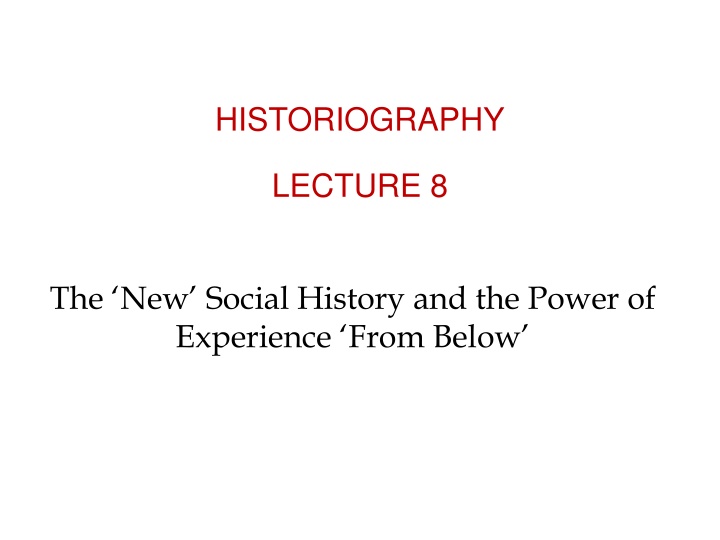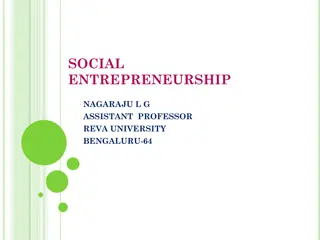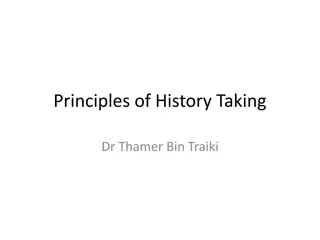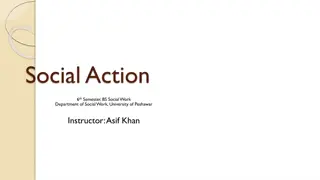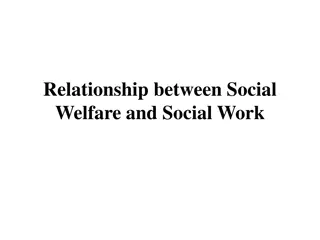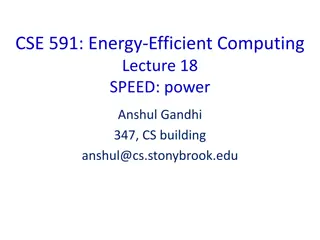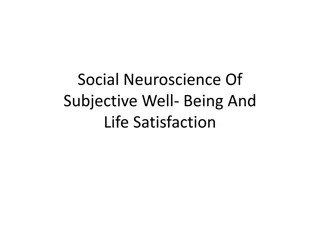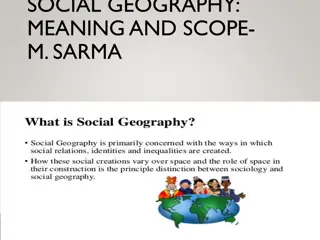The Evolution of Social History: Power of Experience from Below
Explore the transition in historiography from the Annales school to the New Social History, emphasizing the focus on experience and culture from the 1930s to the 1960s. Key figures such as Edward Palmer Thompson and Christopher Hill reshaped historical narratives with their emphasis on grassroots perspectives and revolutionary traditions, challenging traditional paradigms. This shift marked a critical juncture in historical scholarship, advocating for a more nuanced understanding of historical events and their impact on society.
Download Presentation

Please find below an Image/Link to download the presentation.
The content on the website is provided AS IS for your information and personal use only. It may not be sold, licensed, or shared on other websites without obtaining consent from the author.If you encounter any issues during the download, it is possible that the publisher has removed the file from their server.
You are allowed to download the files provided on this website for personal or commercial use, subject to the condition that they are used lawfully. All files are the property of their respective owners.
The content on the website is provided AS IS for your information and personal use only. It may not be sold, licensed, or shared on other websites without obtaining consent from the author.
E N D
Presentation Transcript
HISTORIOGRAPHY LECTURE 8 The New Social History and the Power of Experience From Below
..who fell victim to the fascist and communist belief in inexorable laws of historical destiny.' (Karl Popper, The Poverty of Historicism, 1957)
Between the 1930s and 1960s the disposition of the Annales paralleled those of Marxists: objectivst idea of history as a social science a holistic and totalising approach to history quantitative methodologies long-run analysis (long duree) analysis of economic fluctuation trough prizes, interest in trade flows and population, or geographical conditions a materialist and structural model of causation (e.g. geography in the case of Braudel; forces of productive for Marxists)
The rise of experience and culture as central categories of history writing from the 1960s Edward Palmer Thompson (1924-1993)
Christopher Hill (1912-2003) The 17th century English revolutionary tradition
The Second World War in the Balkans Frank Thompson (1922-1944) Partisans
1948-65 Lectureship in Leeds University Extra-Mural Department, based in Halifax, West Yorkshire to teach English and History Halifax in the 1950s
Communist Party Historians Group and history from below 1946-1956 The Reasoner (1956)soon becomes The New Reasoner New Left Review (1959)
The Making of the English Working Class (1963)
The working class did not rise like the sun at an appointed hour. It was present at its own making.
I do not see class as a structure, nor even as a category, but as something which in fact happens (and can be shown to have happened) in human relationships...Like any other relationship, it is a fluency which evades analysis if we attempt to stop it dead at any given moment and anatomize its structure. The finest-meshed sociological net cannot give us a pure definition of class, any more than it can give us one of deference or of love. The relationship must always be embodied in real people and in a real context. Moreover, we cannot have two distinct classes, each with an independent being, and then bring them into relationship with each other. We cannot have love without lovers, nor deference without squires and labourers. (p.1)
I am trying to rescue the poor stockinger, the Luddite cropper, the obsolete hand-loom weaver, the utopian artisan, and even the deluded follower of Joanna Southcott, from the enormous condescension of posterity...(p.13)
The University of Warwick 1965-1972 Photograph above shows the Humanities Building c. 1964. Source: University of Warwick, Modern Records Centre, Warwick University Archive.
Published as a Penguin Education Special, 1973, a few weeks after Thompson s article `The Business University , New Society, 19 Feb 1970.
Thompson the anti-nuclear activist 1980
Rejection of Marxist structuralism Rejection of economic reductionism (the idea that all action can be traced back to the economic base of a society) Marxist humanism : historical subjects are active in the shaping of their own lives. Resistance: above all a social and political act
Critiques of Thompson Thompson s periodization of this class-formation(c.1780-1850)is wrong. Thompson s representation of the English working class in Making of the English Working Class is partial. In Making of the English Working Class, class is gendered as male, as is working-class experience. Experience is not a valid category for social, historical, or philosophical investigation. Experience is construed as a momentary thing. If class is a relationship, not a thing (Making of the English Working Class), then surely we need to investigate the experience of that relationship from both sides: workers and employers; masters and servants? Inadequate account of culture in Making of the English Working Class:
Witness against the Beast (1994) William Blake, `Behemoth and Leviathan (Plate 15) Illustrations of 'The Book of Job' 1823-26
` There is never the least sign of submission to Satan s Kingdom . Never, on any page of Blake, is there the least complicity with the kingdom of the Beast . E.P. Thompson (1924-1993)
